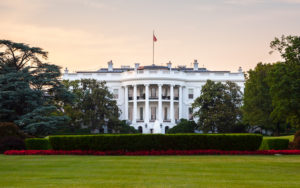
President Biden reinstates travel restrictions for certain non-U.S. citizens, reverses Trump Administration’s transgender military ban, and more…
IN THE NEWS
- President Joseph R. Biden signed a proclamation restricting travel for non-U.S. citizens who have been to the United Kingdom, Ireland, Brazil, or South Africa in the 14 days prior to their arrival in the United States. The proclamation follows the emergence of variant strains of the coronavirus, which have appeared in the countries listed in President Biden’s proclamation. White House Press Secretary Jen Psaki cited both a recent increase of COVID-19 cases and emergence of new variants as justification for enforcing travel restrictions.
- The U.S. Department of Labor issued a final rule that reinstates the agency’s authority to issue nonbinding and nonpublic guidance documents, which the Trump Administration formerly prohibited. The final rule allows the Labor Department to articulate its positions on common problems before the agency’s administrative court and issue documents such as court filings and internal legal memos. The Labor Department also withdrew three of its 13 opinion letters issued during December and January, which interpreted a recent final rule that relaxed restaurant worker tipping policies under the Fair Labor Standards Act. Chair of the House Committee on Education and Labor Bobby Scott (D-Va.) criticized the Trump Administration’s restaurant tipping policy for allowing “dishonest employers to ‘save’ money by exploiting tipped workers.”
- President Biden issued an executive order declaring that transgender individuals can serve in the military “openly and free from discrimination” and reversing the Trump Administration’s ban on transgender military service. President Biden requested the Secretary of Defense and the Secretary of Homeland Security to notify the President within 60 days on their progress in implementing the new policies. Defense Secretary Lloyd Austin stated that the United States Armed Forces are more effective when they represent all citizens and include the most talented members of the population, “regardless of gender identity.”
- Congressional Democrats reintroduced the Raise the Wage Act to increase the federal minimum wage to $15 by 2025. If passed, the bill would require increasing the minimum wage to $8.40 immediately, followed by incremental increases each year. Critics of the bill argue that increasing the minimum wage will harm small businesses and reduce employment. Senator Bernie Sanders (I-Vt.), however, defended the bill by reportedly calling the current minimum wage “a starvation wage.” Similarly, Representative Bobby Scott (D-Va.) reportedly claimed the current minimum wage is “economically and morally indefensible.”
- President Biden signed an executive order directing the U.S. Attorney General not to renew U.S. Department of Justice contracts with privately operated criminal detention facilities. The executive order aims to decrease incarceration levels by reducing the government’s financial reliance on profit-based prisons. By canceling government contracts with private criminal detention centers, the Biden Administration seeks to begin reducing incarceration rates. David Fathi, director of the American Civil Liberties Union’s National Prison Project, reportedly called the order a first step but emphasized that the order does not address private immigrant detention centers and that “President Biden has an obligation to do more, especially given his history and promises.”
- The U.S. Senate confirmed President Biden’s nominee for Secretary of the U.S. Department of the Treasury, Janet Yellen. Fifteen Republican senators voted against her nomination, but Yellen had unanimous support from the Senate Finance Committee. Yellen is the first woman treasury secretary in the position’s 232-year history. Prior to the vote, Senator Ron Wyden (D-Ore.) reportedly praised Yellen for her ability to explain “complicated economic theories and put them into understandable language.”
- The U.S. Environmental Protection Agency (EPA) asked the Justice Department to seek stays in all litigation involving challenges to EPA regulations issued between January 20, 2017 and January 20, 2021. These stays would give the agency time to reconsider or rescind the challenged regulations without devoting resources to the continued court battles. EPA’s request follows President Biden’s recent executive order that all agencies immediately review and take action to address the previous Administration’s regulations that fail to promote public health, protect the environment, or disproportionately harm communities of color.
- President Biden signed an executive order that prohibits agencies from issuing or proposing any new rules until the rules have been approved by an agency head appointed by his Administration. The executive order also requires that agencies immediately rescind for further review all rules that have been sent to the Office of the Federal Register, but that have not yet been published. In addition, the President instructed agencies to consider a 60-day postponement of the effective dates of any rule that has been published in the Federal Register but has not yet taken effect. Bridget Dooling, professor of regulatory studies at George Washington University, said in a report for the Brookings Institution that the executive order demonstrated the new Administration’s “regulatory savvy” and its intention to use tools of administrative law proactively.
- In a press statement, U.S. Department of Defense Secretary Lloyd J. Austin announced that the Defense Department will “prioritize climate change considerations” when conducting risk analyses, developing strategies, and planning guidance. Extreme weather—such as wildfires, storms, and droughts—can affect military actions and bases and result in geopolitical instability abroad. Lloyd concluded by stating that climate change “is a national security issue” that the United States must handle as such.
WHAT WE’RE READING THIS WEEK
- In a recent study published in Tobacco Control, Jungmi Jun, assistant professor at the University of South Carolina, and Joon Kyoung Kim, assistant professor at the University of Rhode Island, found that states that impose taxes and license requirements to sell e-cigarettes have seen fewer young people use e-cigarettes and fewer tobacco smokers overall. Jun and Kim used statistical models to evaluate the effectiveness of five categories of state laws, including taxes and sales licenses, at reducing the use of tobacco products across different age groups. Jun and Kim found that all of the analyzed state laws were correlated with lower e-cigarette and tobacco use, but that only sales licenses were correlated with reduced e-cigarette use in the 18 to 24 age group.
- In a paper, Kilolo Kijakazi, Karen E. Smith, and Charmaine Runes, researchers at the Urban Institute, examined the role of social security in reducing “economic disparities between African Americans and white families.” Although social security has provided income to African American households, Kijakazi, Smith, and Runes found that African Americans continue to face disproportionate economic barriers when compared to white families—including high unemployment rates and lower wages—that lead to racial disparities in social security benefits. Kijakazi, Smith, and Runes found that proposals to increase social security access—such as providing supplemental benefits to individuals who receive low social security benefits—would improve equity for African Americans.
- In a recent article, Elizabeth Luh, Ph.D. candidate at the University of Houston, argued that police officers and troopers may misreport race to avoid accusations of racial bias. Luh estimated that over 30 percent of highway troopers misreported the race of people they encountered in the course of their work. Luh hypothesized that the officers misreported race to avoid workplace consequences, such as disciplinary action for discriminatory policing. Luh concluded that the scrutiny that law enforcement officers face may result in increased misreporting and found that changes in reporting structures can better correlate racial bias to poor work outcomes. Lu recommended that police departments require their officers to ask the race of each motorist they pull over to avoid misreporting.
FLASHBACK FRIDAY
- In a 2017 article for The Regulatory Review, Sam Batkins, former director of regulatory policy for the American Action Forum, outlined the regulatory vision of the then-incoming Trump Administration. Batkins saw potential for the Trump Administration to implement independent agency oversight and regulatory budgeting, which considers private-sector costs in the regulatory process. Batkins concluded that initial executive orders of President Trump would determine the regulatory agenda and whether the Trump Administration would implement regulatory budgeting and independent agency oversight.



